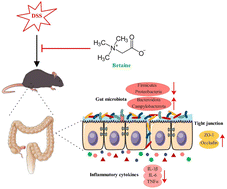Inflammatory bowel disease (IBD) is a multifaceted and recurrent immune disorder that occurs in the gastrointestinal tract. Betaine is a natural compound that exerts beneficial anti-inflammatory effects. However, the role of betaine in protecting IBD is still unclear. Therefore, the aim of our study was to investigate the anti-inflammatory effect of betaine in dextran sulfate sodium (DSS)-induced colitis. The results showed that betaine greatly increased the body weight and decreased the disease activity index score of DSS-treated mice. Furthermore, betaine effectively downregulated the protein levels of pro-inflammatory cytokines (IL-1β, IL-6, and TNFα) and upregulated tight junction proteins (occludin and ZO-1) in the mice. Additionally, betaine exposure remarkably restricted the DSS-induced phosphorylation of IκB and NF-κB p65 in mice. Similarly, betaine pretreatment improved the inflammatory response and intestinal barrier of Caco-2 cells. Betaine altered the gut microbiota composition, markedly decreasing the relative abundance of Firmicutes and Proteobacteria and considerably increasing the relative abundance of Bacteroidota and Campylobacterota in DSS-induced mice. In conclusion, betaine could attenuate colitis via regulating the inflammatory response, enhancing the intestinal barrier, and altering gut microbiota and is conducive to developing new drugs for treating human diseases.

